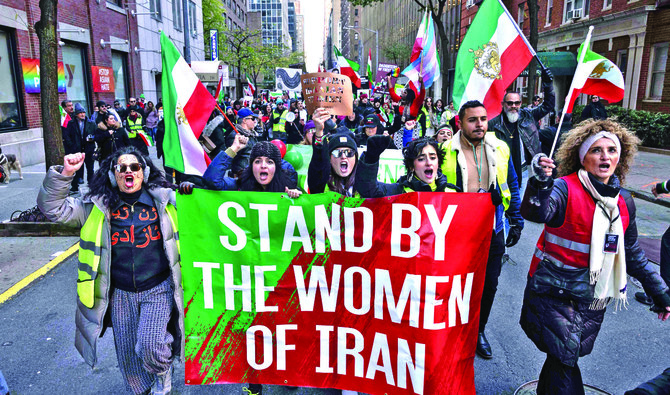PARIS: Activists have expressed alarm that Iran was implementing a major crackdown in a Kurdish-populated town that has seen intense anti-regime protests in the last few days.
Reinforcements of the security forces were sent to the city of Mahabad in western Iran, rights groups said, while images and audio files of heavy gunfire and screams were posted overnight.
Iran’s clerical leadership has been shaken by more than two months of protests sparked by the death in custody of Mahsa Amini, a 22-year-old woman of Kurdish origin who had been arrested by the Tehran morality police.
The very first protests took place in Kurdish-populated areas of Iran including at Amini’s funeral in her home town of Saqez, before spreading nationwide.
Rights groups had earlier posted footage of defiant protests in Mahabad, including after the funerals of victims of the state’s crackdown on the protests, with people staging sit-ins in the streets and setting up barricades.
The Norway-based Hengaw rights group said “armed troops” had been despatched to Mahabad from Urmia, the main city of West Azerbaijan province.
“In Mahabad’s residential areas, there is a lot of gunfire,” it wrote on Twitter.
The group posted footage of helicopters flying over Mahabad which it said carried members of the Revolutionary Guards sent to quell the protests.
Business owners throughout the area were going to observe a strike on Sunday to protest against the violence by the security forces, it said.
The Iran Human Rights group, also Norway based, posted footage Saturday-Sunday that it said showed gunfire echoing around the city.
Its director Mahmood Amiry-Moghaddam wrote that authorities “cut electricity and machine gun shooting is heard ... Unconfirmed reports of protesters being killed or wounded.”
He posted an audio file in which screams are clearly heard amid continuous gunfire.
Kurds make up one of Iran’s most important non-Persian ethnic minority groups and generally adhere to Sunni Islam rather than the Shiism dominant in the country.
Iran’s Tasnim news agency accused “rioters” of “spreading terror” in the town by setting fire to houses belonging to security and military personnel and blocking streets.
It claimed most of the the perpetrators had been arrested, with nobody killed, saying security had returned and denying the reports of a general strike.
Mahabad has particular resonance for Kurds as the main town of the short-lived Republic of Mahabad, an unrecognised Kurdish statelet which sprung up with Soviet support in 1946 in the aftermath of World War II but existed for less than a year before Iran reasserted control.
Hengaw had on Saturday warned the situation was “critical” in the town of Divandarreh in the western province of Kurdistan, where government forces had shot dead at least three civilians.
It also expressed concern about the situation in other Kurdish-populated towns with explosions heard in Bukan and Saqez, as well as gunfire in Bukan.
Hengaw also posted footage it said was from the town of Sanandaj, also in the region, which it said showed a woman being fired upon in a river bed by security forces as she tried to escape.
With the protests cutting across social classes and ethnicities in Iran, the movement represents the biggest challenge to the country’s leadership under Ali Khamenei since the revolution of 1979.
The state has responded with a crackdown that IHR said in an updated toll on Saturday had left at least 378 people dead, among them 47 children.
Protesters have been killed in 25 of Iran’s 31 provinces, including 123 in eastern Sistan-Baluchistan where the protests had a distinct origin but have fed into the nationwide anger, it said.
Authorities have also issued death sentences to five unnamed people over the protests, with Amnesty International saying at least 21 people so far have been charged with crimes over the demonstrations that could see them sentenced to death.
Khamenei on Saturday vowed “punishment” for “murders” and vandalism during the protests across the country.
He was quoted by state television as saying foreign powers “were trying to get people out on the streets” and “exhaust the authorities,” but said they had failed.




























